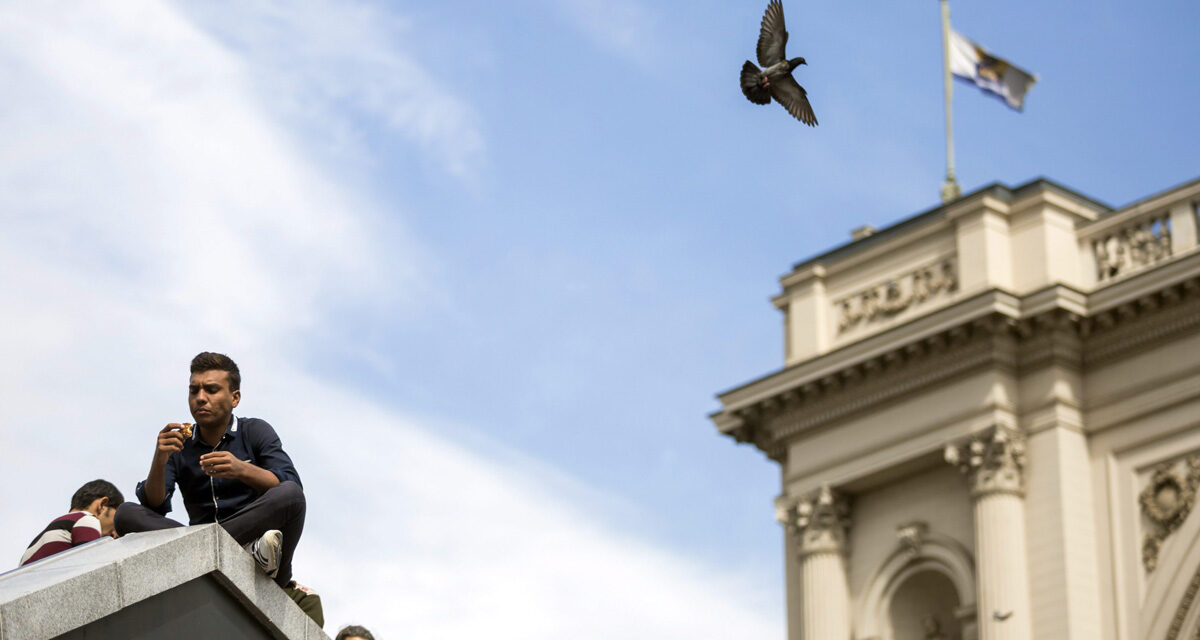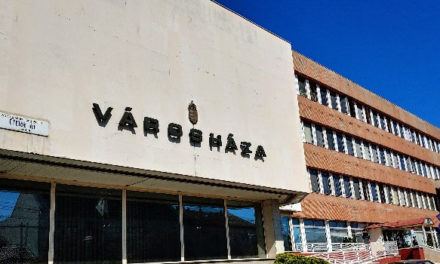Those participating in the program have only one year to use the Hungarian aid, which includes extensive and significant financial support.
About who they are, where they come from and what they do in our country, Lajos Győri-Dani, the program manager of the Hungarian Maltese Charity Service, spoke on the occasion of the reception day.
On August 14, 1989, exactly 35 years ago, the Hungarian Charity Service of Malta took in the East German refugees who were waiting in Budapest and headed for the West, thereby starting the largest humanitarian operation in Europe at the time. In the course of this, 48,000 East German refugees requested and received help in Hungary in 3 months. The inclusion accelerated the abolition of the impenetrable Cold War borders between the Eastern and Western blocs, the cutting of the Iron Curtain or the dismantling of the Berlin Wall were emblematic episodes of this process.
The reception of refugees is still part of the mission of the Maltese Charity Service, but after 35 years, the challenge is no longer primarily the provision of accommodation and care, but rather whether the accepted refugees can be successfully integrated, whether they will be able to live together with us.
An important question is whether we will have to take care of them for a long time, or whether they will be able to take care of themselves and turn from dependents to taxpayers.
An equally important question is whether they can fit in among the citizens of the host country, or whether they will bring their home conditions and customs with them and shut themselves up in their own communities, rebuilding in a small way the world from which they themselves fled, i.e. they will become the "no- go zones" in areas inhabited by refugees.
In recent years, the Maltese Charity Service has become a prominent player in the integration of refugees arriving in Hungary, partly thanks to its own roles that have been taking place for decades, partly thanks to the tasks it received from the government. The organization takes care of a large number of Ukrainian, Venezuelan, Pakistani, Afghan and Armenian people who came to Hungary as refugees and stay here permanently, and its foreign involvement in Africa and Syria also serves the purpose of forcing as few people as possible to leave their homes.
The foreigners in question come to Hungary for different reasons, but they have one thing in common: an unlivable situation has developed in their homeland.
In Venezuela, due to the autocratic left-wing government of President Nicolas Maduro and the accompanying legal uncertainty, violence, economic crisis, and the disintegration of the middle class, almost a thousand Venetian families with verifiable Hungarian ancestry have been evacuated in the last 5-6 years. Knowledge of the Hungarian language is not a condition for participation in the Hungarian integration program. Experience also shows that in a foreign environment, even the third generation of families of Hungarian origin has a high chance of losing their mother tongue, especially if the paternal ancestors were Hungarian. (This also causes the strange, reversed situation that people with Hungarian surnames know less Hungarian.)
Similar to Venezuela, a kind of exodus is taking place from the side of Nagorno-Karabakh, which has a disputed status, and Armenian families who have fled are also participating in the Maltese program on a voluntary basis and in larger numbers. (Some of them also have Hungarian ancestry, as Armenians also studied at Hungarian universities in Soviet times, and thus mixed marriages were born.) From this point of view, Afghan families, around 450 people, occupy a special place in the integration program of the Hungarian Charity Service of Malta. They are typically the ones who, before the Taliban takeover of power in August 2021, cooperated in some form with the law enforcement officers of the western states in Afghanistan, which is why the ground became hot under their feet. Along with them, many Ukrainian families arrive fleeing the war raging in our neighborhood, but there are also persecuted Christians from Pakistan.
What is one year enough for?
Participants in the program do not have much, only one year, to use the help, which includes extensive and significant financial support. After that, using an airport analogy, they have to leave the runway and be able to take off, that is, they have to get a job in Hungary that allows them to provide housing and support themselves and their families. Eight out of ten families succeed in this. The families of 30-40-year-old parents are able to integrate into society most easily, but this proportion deteriorates with age.
The program focuses on families individually, they are provided with a number of benefits, including an independent apartment. Upon arrival, they are taken to their accommodation, the fridge is filled with food, the tickets for the trip are on the table, the phone number where they can ask for help, and the address circled on a map where they have to report on the next working day. According to Lajos Győri-Dani, this is necessary because if they were locked up in a camp (or even just in a house), the linguistic communication of everyday life would not force them to open up to Hungarian society, and this would prevent them from getting to know the operating model here and from understanding. In Budapest and throughout the country, the charity rents a total of 600 apartments, which are financed by an EU grant in the case of refugees from conflict zones, and by government funds in the case of members of the Hungarian diaspora.
The main element of integration is not the perfect mastery of the Hungarian language, but the facilitation of the family's integration, which is successful if it wants to integrate of its own accord.
- emphasized the vice president of the MMSZ. This is mostly achieved in the case of those who - after a certain grieving process - renounced their country and do not want to return there. Among them are primarily the persecuted Pakistanis, Venezuelans and Armenians. They immediately enroll their children in kindergarten and school, which, in addition to indicating the seriousness of the intention, also enables parents who struggle with the Hungarian language to have their 10-12-year-old children interpret during administration. Children are also crucial in the process of integration, because many families decided to leave their homeland precisely because of them, for their well-being. However, Ukrainians and Afghans are not among them, because they did not come of their own volition, but to avoid immediate danger to their lives.
The Afghan strike
About 450 people came to us from Afghanistan in August 2021, but they were also the biggest failure of the program so far. Because the mentors experienced it as a clear blow that there are only six of their families here. In any case, their departure could not have been a complete surprise, as when the plane landed with them, they declared that they wanted to go to America. However, such a promise was never made. The Afghans were also only willing to listen to the presentation explaining the purpose of participating in the program as a group, neither then nor later were they willing to communicate with the staff of the charity service individually. They were only able to formulate any complaints or requests as a group - typically 20-30 men speaking together. Afghan society is based on the power of the community to assert its interests. It was only after the third explanation that they understood what was expected of them. Their advocate was able to articulate it: to fit in and become useful members of Hungarian society. However, he added, they do not want to live like this and do not want to live here. After that, the majority of the families left Hungary, and since then they presumably live in a part of a Western European city inhabited by Afghans.
According to Lajos Győri-Dani, the conditions for living in a clan, in a closed large community, are much more given in Western Europe, because the mass and territory of the given genus already exist there. This practically means no-go zones,
but the Hungarian aspiration is precisely to prevent the formation of such segregated, parallel worlds. Of course, the Italian diaspora in America, or even the Hungarians in Venezuela, were on a micro level a kind of closed community, but the essential difference was that their members lived in the same way as local families on a daily basis, the adults worked, the children went to school, the differences never reached the social a level of operation that would have decisively affected the basic functioning of the local population. Integration had a "core level" that everyone accepted. The Hungarian house in Venezuela was a cultural hub, while the suburbs of Stockholm, for example, were a Muslim ghetto.
The rules of social coexistence are not written down anywhere, the legal framework only records what must not be done. Therefore, it is difficult to understand and accept, for example, why it is appropriate for men to give up their seat on the tram to a woman. While Hungarianness is the cultural and identity link with the Venezuelans, and Christianity is the cultural and identity link with the Pakistanis, there is no common ground with the Afghans. Obstacles all the more. An Afghan woman, for example, cannot enter the open labor market, but can only work in the clan's business enterprises, with a relative who can guarantee her safety, or as a domestic worker. An Afghan man feels embarrassed or afraid near a scantily clad European woman on the bus, because he cannot be sure that if he looks at her, he will not get in trouble because of the relatives traveling with him who are protecting the woman.
These dynamics are not necessarily bad or exaggerated, they are especially logical in their cultural environment, but European society thinks very simplistically about it and is quick to judge because of the incompatibility.
On the other hand, it creates continuous uncertainty, which leads to the fact that Afghans do not even want to understand the rules of European coexistence.
The staying power of more closed, family-based and acquaintance-based communities is also present among Venezuelans, but this appears as a positive aspect that helps integration (taking care of each other's children, help in navigating the world of work, etc.). A quarter of resettled families live in rented apartments in rural areas, but experience shows that their integration there is much more difficult. In Hungary, Budapest is the only world city that offers an easy chance to establish yourself even for someone who speaks a foreign language. The training opportunities in the capital are also almost impossible to reproduce in the countryside. In the case of many of them, the one-year program also includes individual therapy, as quite a few come with post-traumatic stress syndrome (PTSD). They can also be handled more easily in the capital.
When support ends
In addition to providing housing, the families also receive financial support, but part of the monthly appanage is automatically transferred to a savings account. This primarily helps with the first large expenditure after the end of one year of the subsidy, usually when the apartment lease is signed, the deposit is paid from this. In the first years of the program, even this was not enough, 30 percent of families asked MMSZ for money in addition to their savings. Today, such loan requests have reduced to almost zero, and this may be partially due to the help of their compatriots who have already settled in. Getting to know the plans of the arriving families as soon as possible is also essential because they are trying to rent apartments that can be a long-term solution in Hungary. The experience is that even after the one year has passed, they remain in the apartment where they were placed, only the tenants themselves.
Unfortunately, not everyone can take off from the runway. According to the vice-president of the MMSZ, it is partly related to the traumas caused, and it also happens that the family breaks up during the stay in Hungary. If one half of the family leaves, the remaining member of the family can hardly cope with the challenges alone.
Just think, if we were to be placed with our family - no need to think of a distant, exotic country - in a big European city with all kinds of support, but here we go: start over!, how would we manage?
- he asked, stating that neither the work invested in the charity service, nor the considerable amount of money spent on it, guarantees the success of the integration of the (constantly arriving) foreigners. According to experience, those arriving without family, typically younger couples, choose the path that many young Hungarians also take, which is to go to the West. Venezuelans cross the language barrier mostly to Spain.
The thousands of resettled foreigners living here can receive the so-called National Settlement Permit, and those who can prove Hungarian ancestry can also receive citizenship. Both create a social security legal relationship. Minors and those over the age of 65 are subject to legal rights, and others are given the opportunity to work. With a residence permit and a registered permanent address, they can even vote in local government elections, and although there was a small fuss about this on June 9, Lajos Győri-Dani says that even their many years of integration have not reached the level where they can participate in the shaping of Hungarian public life by voting. .
Featured image: A pigeon flies past a migrant man at Keleti railway station on September 7, 2015. MTI Photo: Balázs Mohai













